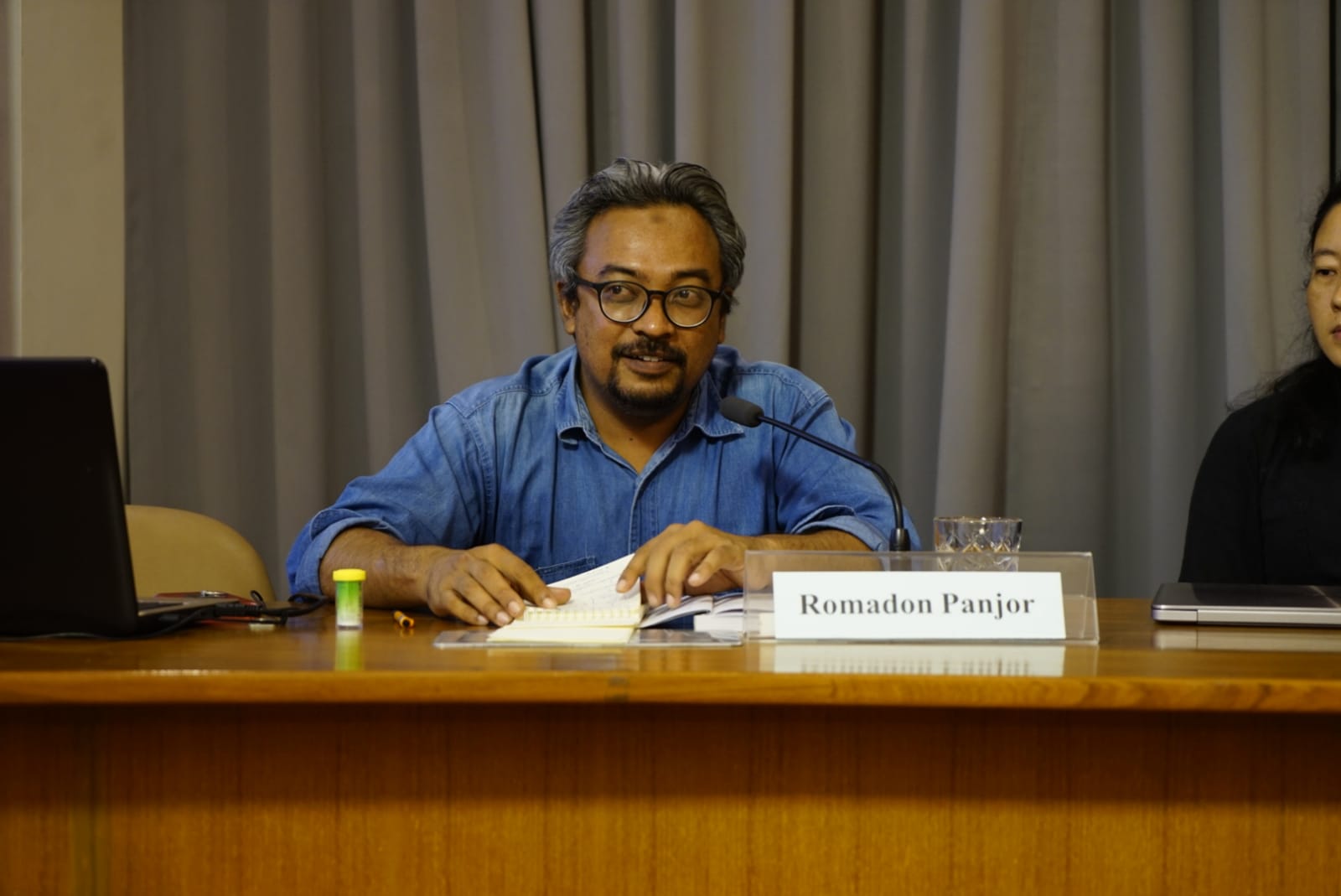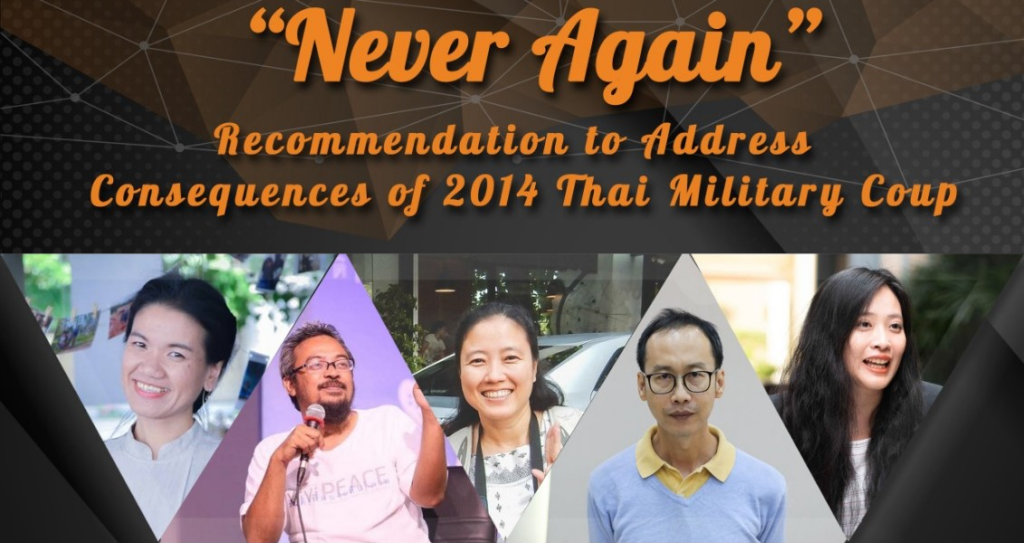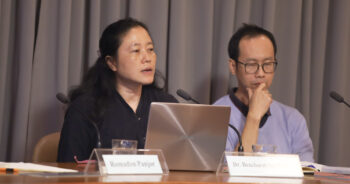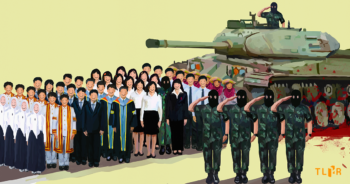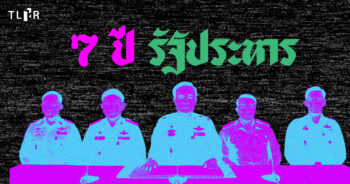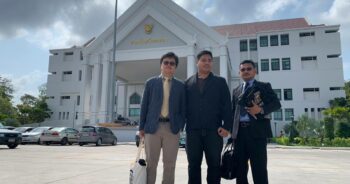| On 29 October 2019, 18.00 at the Foreign Correspondents’ Club of Thailand (FCCT), the Thai Lawyers for Human Rights (TLHR) held a public discussion entitled “Seize, Trample, Repeat, Change”, the Launch of Propositions to Remedy the Consequences of the 2014 Coup, concerning the laws, policies and justice process intended to ensure the protection of people’s rights and freedoms. The three speakers included: – Dr Bencharat Sae-Chua – Institute of Human Rights and Peace Studies, Mahidol University – Assoc. Prof. Somchai Preechasilpakul – Faculty of Law, Chiang Mai University – Romadon Panjor – Deep South Watch with Thitirat Thipsamritkul from the Faculty of Law, Thammasat University as moderator. Participants were also encouraged to share their opinions and exchange thoughts with the speakers. The publication is available at https://tlhr2014.com/?wpfb_dl=112 Video from the seminar can be viewed here https://www.facebook.com/PITVFanpage/videos/449010922639828/ For input from other speakers, please see Bencharat Sae-Chua: “Everyone in Thailand is a Victim of the NCPO’s Violations”
|
——————————————-
Southern Border Provinces are a test site for the military forces prior to nationwide replication of their methods.
Regarding the book on how to deal with consequences from the 2014 coup, Romadon Panjor from Deep South Watch finds it not only useful for the current situation but a historical document critical for future generations as it demonstrates just how distorted the current situation is.
Significant distortion is also at play in the Southern Border Provinces situation, which has dragged on for over fifteen years, since 2004. In light of TLHR’s propositions, and from the perspective of an activist from the South, it dawns on him how extremely distorted the situation is, as far as what has been happening in Thailand over the past few years. It appears to him that the Southern Border Provinces such as Pattani are just the testing sites. They are merely areas for testing certain tools. They are areas where they experiment with the exercise of all these corrupted powers. From there, their methods have been replicated and applied countrywide. In other words, people in the Southern Border Provinces are slated to be the initial group to face the damning impacts of policies which have since spread throughout Thailand.
Recalling what Somchai Preechasilpakul said, Romadon recalls one of the greatest distortions of the truth: when the Head of the NCPO denied being a public official. In the same vein, public officials in the Southern Border Provinces, officials of the ISOC Region 4 Forward, and armed officials often claim that they are not a party to the conflict. They continually deny having a role in these fatal conflicts even though the number of fatalities has surpassed 7,000 individuals. Language is therefore an important issue. It frames our minds. It guides the way we think and our perspective on problems as well as our potential to imagine solutions. One thing the Thai state has done quite efficiently in the Southern Border Provinces has not been the use of armed forces. Rather, it has been framing people’s thoughts by highlighting one problem, while hiding another from sight.
Military reform and ideological dimensions
Reviewing TLHR’s propositions, Romadon finds it pertinent to take security issues back into the hands of civilians. Most of the recommendations by TLHR are technical. They are about legal issues. It is as if you are a mechanic; if your car has a problem, you know how to tweak this and that to fix it, i.e. by proposing amendments to certain laws, or parts of the laws that legitimize the power of the NCPO. Some laws which cause problems need to be amended or repealed.
One thing that may have been missed out in the book is the ideological aspect, the militarization process and how the military has become a hegemony in Thailand, the case of which is so obvious in the Southern Border Provinces. And it has massive ramifications on the political process. Even peace talks have largely been dominated by militaristic and tactical issues.
The military ideology creeps into remedies as well. Remedies in the Southern Border Provinces had initially been pushed by civil society to ensure state mechanisms respond to the remedial needs of the affected people. Later on, remedies were politicized to serve political purposes, to promote loyalty to the state, and to antagonize the hostile parties.
Romadon finds that the justice process, remedy, peace dialogue and other aspects have been exploited by the military junta. Plans are devised based on a military perspective, whereby threats are identified and other groups are defined as hostile parties, regardless of whether this is, in fact, the case. As in a tactical military plan, other parties are always viewed as hostile and there is a perceived need to find the origins of their support. This logic plays a significant role in any solution proposed.
The Southern Border Provinces have borne witness to such tactical plan experimentation since at least the 2006 coup. TLHR’s publication recalls how the armed forces have expanded their powers to interfere in political and civilian affairs. From the promulgation of the Ministry of Defence Organization Act, to the Internal Security Act in 2008, military policies have enabled power accumulation and experimentation in the Southern Border Provinces. One of the reasons cited to justify the promulgation of the Internal Security Act and the revival of the Internal Security Operations Command (ISOC) in 2008 is the need to quash threats in the Southern Border Provinces.
The consequences of the NCPO and the implications on the Southern Border’s suffering
Romadon says that although the publication claims from the outset to not touch on Southern Border Provinces issues, much of the fallout from the NCPO era will have significant ramifications on the situation in the Southern Border Provinces. One example is NCPO Order No. 14/2559, which has not been mentioned much as it may indicate some uncertainty within the military regime. The Order led to the disbanding of the Advisory Council on the Administration and Development of Southern Border Provinces. The Council was not much known to the public since it only lasted a few years after the promulgation of the Southern Border Province Administration Act in 2010. It reflected a hostile rivalry between the armed forces and politicians, which had existed since the 2006 coup.
The Democrat-led government tried to revive the Southern Border Province Administration Center (SBPAC) to counter-balance the role of ISOC; hence the law was passed in 2008. In other words, since 2010 we have had agencies from two major forces attempting to manage the problems in the Southern Border Provinces. On the civilian side was SBPAC, whose focus was on development, and on the military side was ISOC, a security agency. After 2014 however, SBPAC’s roles were subjugated to ISOC under NCPO Order No. 14/2559.
In 2010 the Advisory Council on the Administration and Development of Southern Border Provinces was established, composed of representatives of people selected from various occupations. It became a platform for people in the Deep South to have their voices heard. They could also participate in decision making concerning the development of policies for the administration and development of the Deep South. People could have a say in shuffles of government officials who misbehaved. People had quite a lot of power then. But during the NCPO era, these mechanisms were done away with. They were replaced by new mechanisms which function as a conduit between the central power in Bangkok and the peripheral power in the Deep South.
Assessing the armed forces’ ability to solve problems and the courage to confront the problems of “Thai-ness”
Romadon suggests that to ensure the armed forces are put in order, two issues regarding the Southern Border Provinces must be resolved. First, the ability to solve problems – the ability of the armed forces to put the problems to rest, and second, the issue of courage.
We need to bring it to public discussion, out in the open, to reach a conclusion on whether the armed forces are really up to the task; are they really capable of dealing with the problems they are assigned to deal with?
Regarding the Deep South, as a result of the mechanisms, laws, and financial and human resources that have been sacrificed over the past fifteen years, an important benchmark is the decline in insurgent incidences. Despite that, many local people feel the conflicts have yet to be resolved. Right now, the armed forces or the government can only manage to suppress the situation, not allowing it to develop. They believe the root causes of the conflicts lie in long-standing political problems which have yet to be resolved. This neglects to mention the rights violations and other injustices which have not been raised for serious discussion.
As for courage, Romadon finds it pertinent that we agree about the importance of courage in order to deal with the problems in the Southern Border Provinces once and for all. His observation is that despite huge power and resources, the military-led Thai state lacks both the ability and courage to resolve the protracted conflicts that have gripped Thailand for several decades. We need to tackle the root causes. Additionally, we must confront the issue of “Thai-ness”, but the Thai military would not dare touch on the issue. Lessons learned from elsewhere show it requires courage to face the issue upfront, the courage of a civilian government. Only under a courageous civilian government may such a problem be broached.
The use of security language to nurture dialogue for military reform
Romadon finds that besides legal mechanisms, it is essential to encourage people to ask questions. How can such questions be asked? Perhaps in Parliament. One of the propositions raised in this book is a more influential role of Parliament to hold the exercise of force by the armed forces in check. Such Parliamentarian debate requires knowledge, experience, and perspectives from civilians.
“Bencharat proposes that such dialogue can be forged by using human rights language. It is undoubtedly essential. I would like to further propose to the public, the media and people who work on political conflicts that it is perhaps important to adopt a security language in order to approach the security agencies, in order to forge a conversation with them. And if this proposition is effective and can bring about change, it will bear upon a solution for reform, the reform from within. I personally believe there has been much discontent among security personnel, and in the end, the issue concerns the courage and dignity of the armed forces itself.”
Romadon proposes that it is important to identify the avant-garde, the progressive, the people on the inside who recognize the problems within the security agencies. And to identify them, we need to speak the same language they use. We need to speak the same language they use to communicate. And we need to reinforce the progressive elements within the security apparatus. This is a missing link. It is fine that this book reflects the problems from the viewpoint of rights activists. But what we need to do more is to reinforce the progressive elements within the security sector.
The need to lift Martial Law
Romadon also comments on a proposition to amend or repeal Martial Law, the imposition of which has always preceded any coup. Martial Law has been imposed in the Southern Border Provinces as well, much earlier than any other parts of the country, since 2004. To many, the law must be amended, and this book suggests Martial Law be repealed. Romadon agrees. But as far as the case of the Deep South is concerned, there has been a move to ban the use of the term “conflict” to depict what has been happening in the Southern Border Provinces. “Conflict” appears to be a word shunned by the security agencies in Thailand over the past ten years. There was an instruction from the Royal Thai Army in late October 2009 prohibiting all military units from using the term “conflict” and to avoid other terms such as “BRN”. It was suggested that the term “insurgent” be replaced with the “perpetrator of violence.”
For the armed forces, the use of the term “conflict” helps to magnify the hostile parties and the situation, elevating the issue of the Deep South to an international issue. The policy adhered to by successive governments since the 2006 coup was to domesticate the issue of Deep South, making it an internal issue.
The thing is, according to Romadon, that Martial Law should be imposed during wartime. Now the situation has become quite cumbersome since Martial Law, the law of war, has been imposed in the area. One subject he sees for discussion between human rights activists and people who are concerned about security issues is the dismantling and replacement of Martial Law with the Law of Armed Conflict. Martial Law should only be used to contend with external threats. This issue is critical, since Martial Law has often become one of the early tools used to mobilize armed forces to seize ruling power. It has become an important tool to hold individuals in military barracks for up to seven days. Romadon sees the potential to raise this issue for further dialogue with people in the security community.
